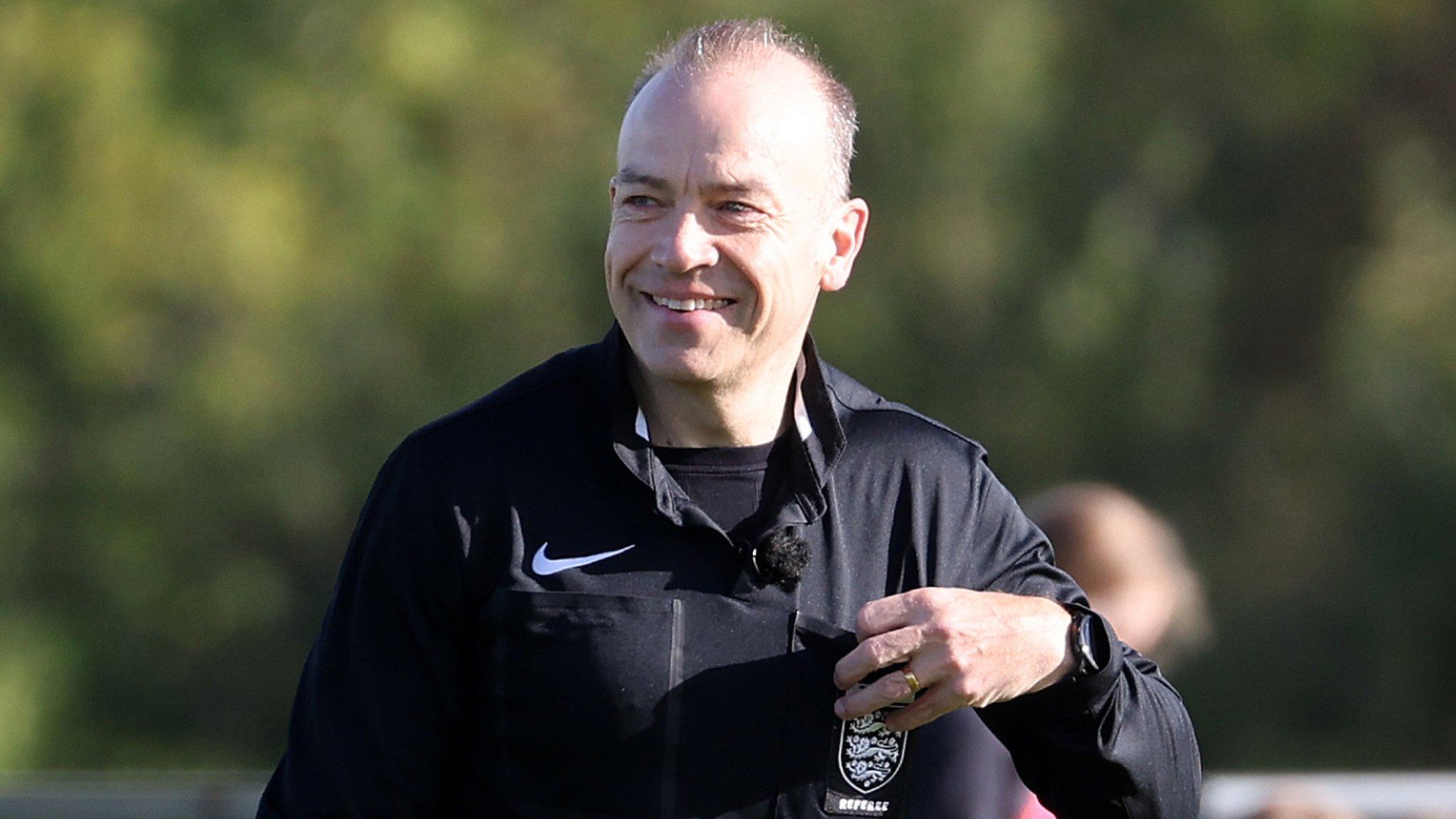Chris Heaton-Harris: Who is Northern Ireland's secretary of state?
- Published
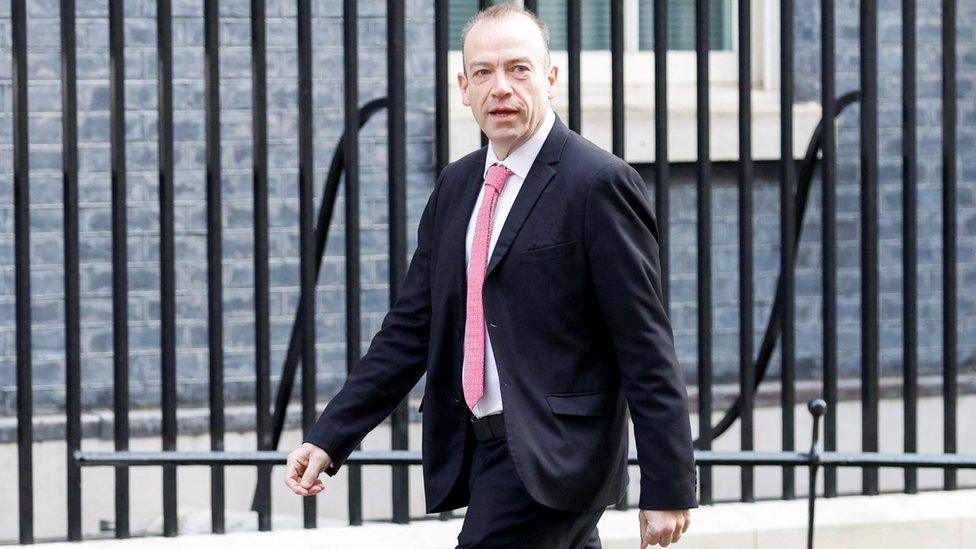
As Northern Ireland secretary, Chris Heaton-Harris is in what many in Westminster regard as an unpopular job
Chris Heaton-Harris kept his position as Northern Ireland secretary after Prime Minister Rishi Sunak appointed his cabinet.
Mr Heaton-Harris was originally appointed by Liz Truss and after the end of her short reign he was retained by her successor, despite supporting Boris Johnson's bid for a return to 10 Downing Street.
He is the third Conservative MP to hold the role since July and continues to face some major challenges in the role, not least the lack of a functioning power-sharing government in Northern Ireland.
However, as a qualified football referee he is accustomed to being the man in the middle.
Who is Chris Heaton-Harris?
The MP for Daventry since 2010, Mr Heaton-Harris was previously government's chief whip - coincidentally (or perhaps not) a role also held by Julian Smith before he became Northern Ireland secretary in 2019.
He was at one stage a member of the European Parliament (MEP) and staunchly pro-Brexit.
For six years he chaired the Eurosceptic group of Conservative MPs - the European Research Group (ERG).
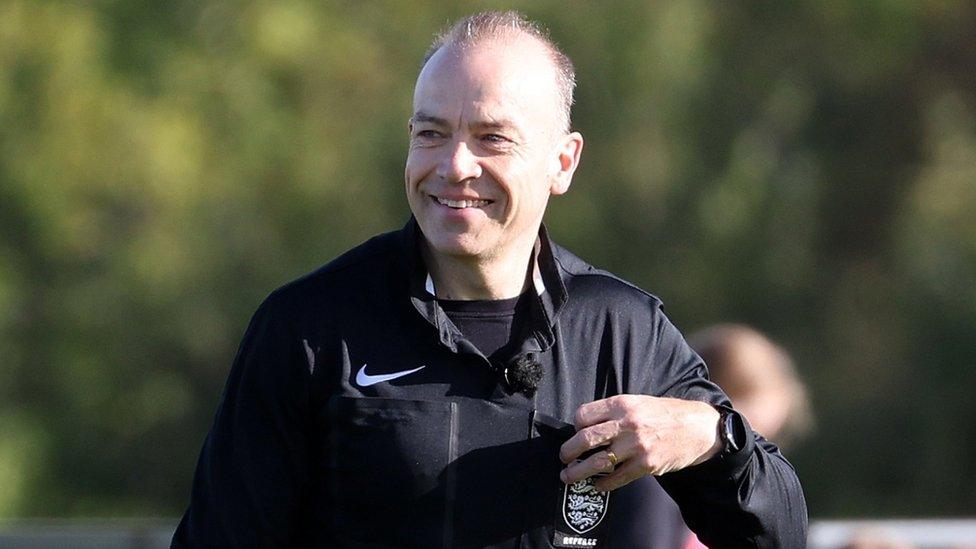
As a qualified football referee, Chris Heaton-Harris is accustomed to being the man in the middle
He drew controversy in 2017 when he wrote to UK universities asking for names of professors who taught courses on Brexit.
But it is part of his personal resume that he has perhaps been drawing on during his time here so far.
According to his website, he has been an active and qualified football referee for more than three decades.
That could come in handy when it comes to stewarding the polarised parties on the Stormont pitch and he may not shy away from showing them a red card or two.
What's in his in-tray?
When he first took on the role, top of his list was getting the power-sharing institutions at Stormont restored, which depends on how the Northern Ireland Protocol row is resolved.
So far, he has made no progress on getting devolved government back up and running.
The DUP was returned as the second largest party in May's assembly elections behind Sinn Féin, which became the first nationalist party to win the most seats at Stormont.

Chris Heaton-Harris pictured in 2001
The unionist party has refused to re-form a government until Downing Street acts to change the protocol, either via the protocol bill currently in transit through Parliament or via negotiations with the EU.
Mr Heaton-Harris had repeatedly pledged to call another assembly election after the deadline of 28 October to restore power-sharing came and went.
Last week he said he still planned to call a fresh poll, as he is bound to do by current law, but on Friday he confirmed this would not happen before Christmas.
The latest it could take place within the 12-week period set by Westminster is 19 January but that would require a campaign over Christmas.
Instead, Mr Heaton-Harris may now have to delay the new deadline by passing legislation at Westminster.
He has already faced criticism from some political parties for rowing back from his initial pledge.
Given Stormont's politicians have been getting their full pay for months despite the lack of a functioning government, he may at some point have to consider cutting their salaries too.
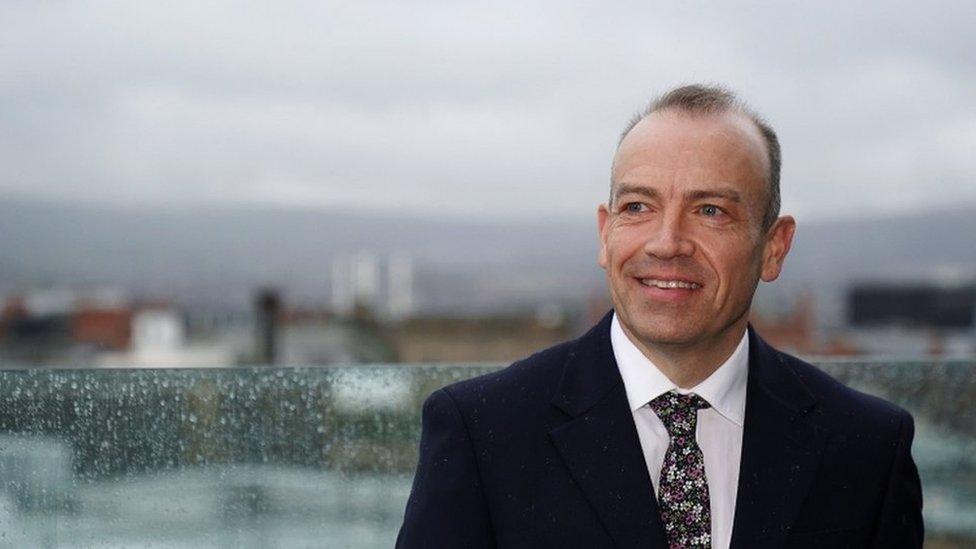
Chris Heaton-Harris has committed to calling an election if the executive is not established but no date has been set
Another major issue facing the NI secretary is the contentious bill to deal with investigations into Troubles legacy killings, which has been criticised by both victims' groups and political parties.
It is due to be considered by the House of Lords next, and while it is unlikely to fall there will be attempts by peers to water it down.
A further question Mr Heaton-Harris faced when he took office was whether he would continue with the stance adopted by his predecessor Brandon Lewis on commissioning full abortion services for Northern Ireland.
His decision was that he would do so, external.
He previously voted for Westminster to change Northern Ireland's abortion laws but now faces the task of directing officials to design and run the services, due to deadlock at Stormont over it.
Why was he chosen for the role?
Mr Sunak has kept many ministers from Ms Truss's cabinet in place, including at the Foreign Office and Ministry of Defence, and has brought back several big names from Boris Johnson's cabinet including Justice Secretary Dominic Raab and Levelling Up Secretary Michael Gove.
It seems the prime minister has opted for a degree of stability at the Northern Ireland Office as well, especially given the high turnover there in recent months.
Mr Sunak professes to share Mr Heaton-Harris's views on the Northern Ireland Protocol - the controversial part of the post-Brexit deal between the EU and UK which keeps Northern Ireland in the EU's single market for goods.
Both men say the protocol must be changed and in recent weeks talks have resumed between the UK and the EU on the Northern Ireland Protocol, but it has not been sufficient to satisfy the DUP's demands.
In January, when he was a junior minister at the Foreign Office, Mr Heaton-Harris visited Larne Port to talk to businesses about the protocol, external, saying he believed a deal could be done with Brussels to change post-Brexit trade arrangements.
He also voted for the government's bill aimed at overriding much of the protocol during all its stages in the House of Commons.
Why is Northern Ireland an unpopular job in Westminster?
Could it be because it is often seen as a poisoned chalice, a role that traditionally brings many challenges with little reward - and little influence in cabinet?
Could it be because some of those who have previously done the job have done or said things exposing a lack of knowledge about Northern Ireland?
Or could it be because a lot of time is spent flying back and forth to Belfast, a place few Conservative MPs have spent much, if any time?
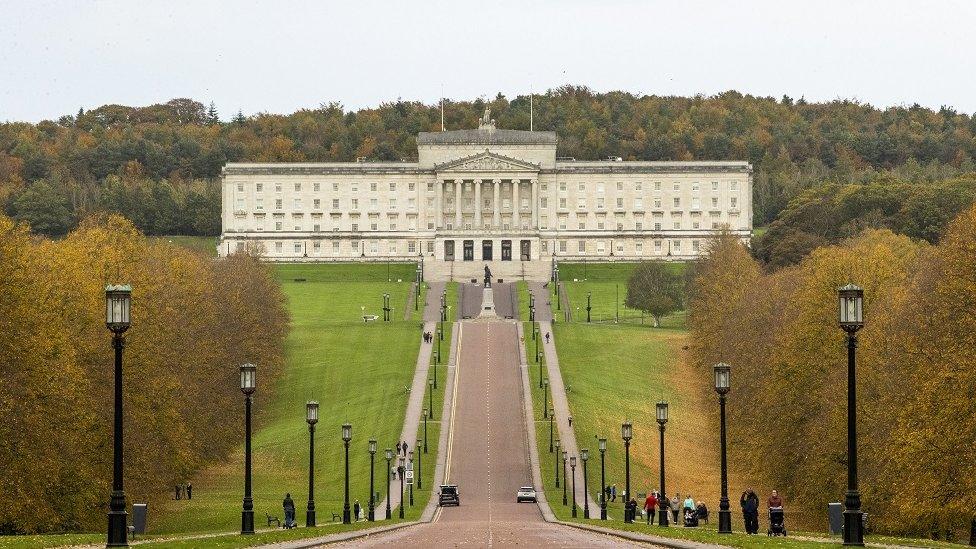
Northern Ireland Secretary is seen as an unpopular job in Westminster
In truth, it is probably a combination of all this and more.
Even the political satire TV show The Thick of It repeatedly joked about Northern Ireland as a punishment posting or demotion.
However, there are those who view the role as a stepping stone to bigger cabinet posts.
Labour's Peter Hain went on to become the work and pensions secretary while Brandon Lewis, one of Ms Truss's loudest proponents, was promoted to justice secretary.
He didn't last long in that role though, quitting cabinet when Mr Sunak became prime minister.
Related topics
- Attribution
- Published14 October 2022
